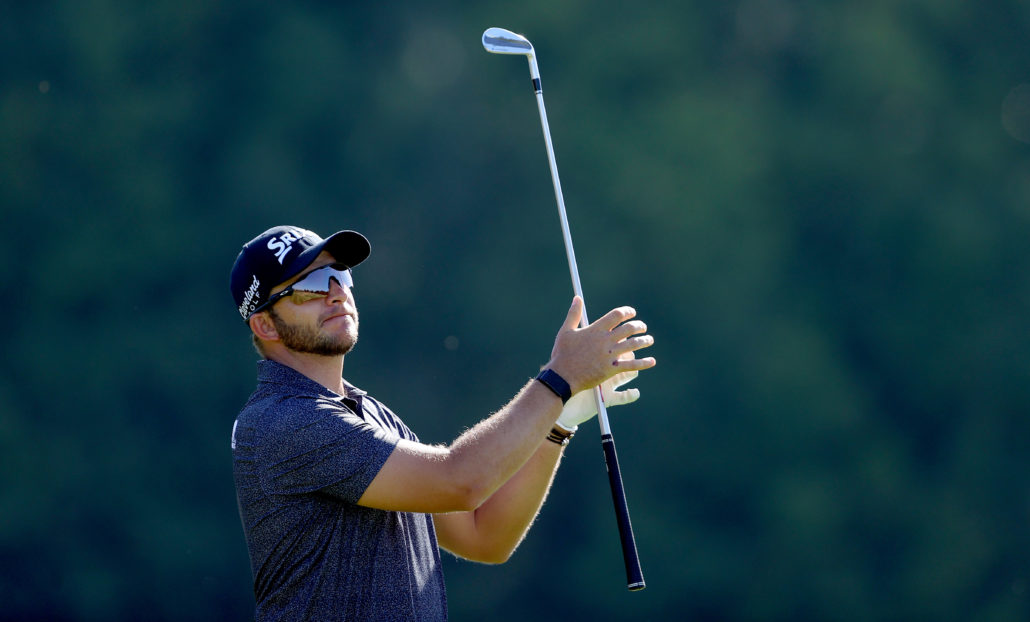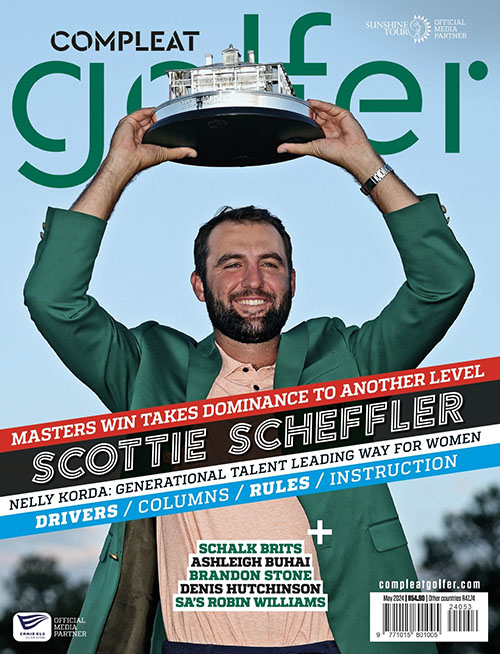All it takes is a few seconds. A few seconds at impact for something to change. For a golf ball to bounce left instead of right. For a putt to drop in or lip out. And in the case of Dean Burmester, for a routine drive to the golf course with his family to turn into a life-changing moment.
‘We were involved in that car accident on the Wednesday before the Dubai Desert Classic, and I woke up that Thursday morning with a totally new outlook on life,’ says Burmester. ‘Fortunately we were all OK, but it could so easily have been different. To come away from that accident alive and injury-free, and to be able to play the next day was a blessing. And I saw it as such.’
Burmester finished tie-third that week in Dubai, his best finish on the European Tour in five months. And in a strange way, the harder it got in a crazy 2020 of pandemics and lockdowns, the more clearly Burmester began to see his life and his career. He had four top-10 finishes on the European Tour, including fourth at the South African Open at the end of the year. And a year that started with a life-changing moment in Dubai ended with a top-14 finish at the season-ending DP World Tour Championship in the same city.
‘The added pressure I was putting on myself to perform and win tournaments and make enough money to keep surviving and living my dream – that just fell away. I realised that as long as I have my family, I’ll be OK. And suddenly, without any form leading up to it, I had that third-place finish in Dubai. That set up my whole year, and I’ve been trying to stay in that mental state.’
READ: Celebrity of the Month: Lloyd Harris
Burmester readily admits that after a few tough seasons he was in ‘a dark place mentally’ on the golf course. The pressure to perform had become debilitating. It’s not always appreciated just how fine the margin between success and failure is at the highest level of the game. ‘If you finish inside the top 10 at a tournament, you aren’t that far away from winning it. It really just comes down to one mental error you made, one plugged lie or one bad shot.’
And it’s the intense focus on this level of detail that can take a professional golfer down a slippery mental slope.
‘It’s so easy to fall into that. I mean, if McDonald’s is across the road from your house, it’s easy to stop there every day. To get out of that, you’ve got to stop looking at McDonald’s. Even late last year when I was playing well, I went to the Scottish Championship with that old mindset of putting pressure on myself to perform, and started missing short putts. I let it all get to me again [he missed the cut that week]. It took me a while to get over it, and then I finished fifth at the Italian Open. So that car accident taught me how to get out of that way of thinking. I’ve realised it’s just not worth getting down on yourself that much. Recently I was on the range and a guy came up to me to say I should be really proud of the season I had. And then he said, “One thing you must always remember is that there are a million guys out there who want to do your job.” He’s right. I’m living my dream, and sometimes you need to hear that again.’
And in a game that has always been built upon the seemingly immutable law that you should always keep your eye on the ball, Burmester is finding freedom in doing the opposite.
‘I’ve started listening to podcasts and documentaries about things I would never have done before – more enlightening and positive things. Topics such as how we can change our lives through behaviour. That’s the attitude I want to get into every morning. Golf is just a part of life. If you can be happy in life in general, you’ll play better golf.’
It’s reminiscent of Rory McIlroy’s similar journey when he started meditating in the morning and reading books such as The Greatest Salesman in the World, The Obstacle is the Way, Digital Minimalism, Ego is the Enemy and biographies of people such as Steve Jobs.
And it has laid a foundation for Burmester to emerge from a difficult 2020 even stronger than before. Growing up in Zimbabwe and hailing from a highly talented and competitive sporting family, he has always been incredibly driven and mentally tough. He relishes the life of professional sport, and enjoys the challenges this brings. But he has now given himself an even greater depth to his mental strength that could be the breakthrough he has been working towards.
‘I’ve been criticised for being too hard on myself. But the harder it is, the more I enjoy it. I enjoy playing in tournaments where one under wins, rather than 30 under. I enjoy it when every par you make feels like you’re gaining on the field, rather than those tournaments where if you’re not making 10 birdies a round you’re losing ground. The mentality of relishing the challenge is what I grew up with. My dad [Mark] was a cricketer and he loved his Test cricket the most. I have that same mentality – that the more body blows you can take as a batsmen from an aggressive bowler, the better.’
To be able to balance this with a greater appreciation of his life and career and his new ‘bigger-picture’ mentality could well be the final piece of the puzzle Burmester has been looking for. It’s as if the challenges of 2020 have given him an even greater mental strength.
‘I saw it during lockdown in 2020. To have five months at home with my family was amazing and I chose to see it as such. Pro sportsmen never get that opportunity. Then we got back out there and things are massively different. The first few tournaments under the new restrictions took some serious getting used to. I wear my heart on my sleeve on the golf course. I like to have fun out there and talk a lot. It was hard not to be able to hear each other properly behind masks, or not be able to fist bump a playing partner after he’s hit a good shot. Everybody was keeping their distance and nobody knew how to react to it all. It became really lonely and it was mentally very tough. On a personal level it was just as tough for me. I had to get used to tournament bubble situations all over the world and not having that social aspect to golf. It’s quite a big part of my golf. I know a lot of guys struggled.’
Burmester saw how mentally difficult it was first hand when, during his opening round at the British Masters with Andrew ‘Beef’ Johnston, the English golfer walked off the course. ‘After nine holes he just said to us that he has a wife and new baby at home and that he couldn’t keep being in a hotel room on his own. He apologised and left. In the beginning it really took a heavy mental toll on a lot of guys. But if you got through those first six weeks, I felt like you could mentally prepare yourself. That stretch was the hardest, but then it started to get easier.’
And this is what gives him so much confidence about 2021.
‘Let’s be honest, I haven’t played well in South Africa over the past few years. So to have the good results at the end of last year gave me a lot of confidence. I was in contention a lot last year. Before I won the Tshwane Open in 2017, I was also in contention a lot. So that’s quite encouraging for me.’
Burmester has also reached a deeper understanding of his game and has built what he believes is the perfect team for what he wants to still achieve.
‘I’ve learned the real strengths and weaknesses in my game. I know exactly what works under pressure, and I’m learning how to play well on golf courses that don’t really suit me. I’ve got the right people around me with Grant Veenstra as my coach, Garth Milne helping me to get fitter and stronger, and Andy Paisley helping me with my putting. My manager, Ally Mellor, is also one of my best friends. And my caddie Jason Reynolds is one of the best in the game with 16 years of experience. These are all people at the top of their industry. So I have this consistency of excellence around me. And I believe that’s what the best players in the world do – they find something that works and then they keep repeating it. I’d like to think I’ve found something now and can make 2021 a big year.’
And it’s not so much swing thoughts that he’ll fall back on when times get tough again, but rather the memory of a few seconds that changed his life.
‘The memory of that accident will never leave me. I’ll never forget how quickly it happens, how quickly your life can change. That’s the memory I draw on.’







